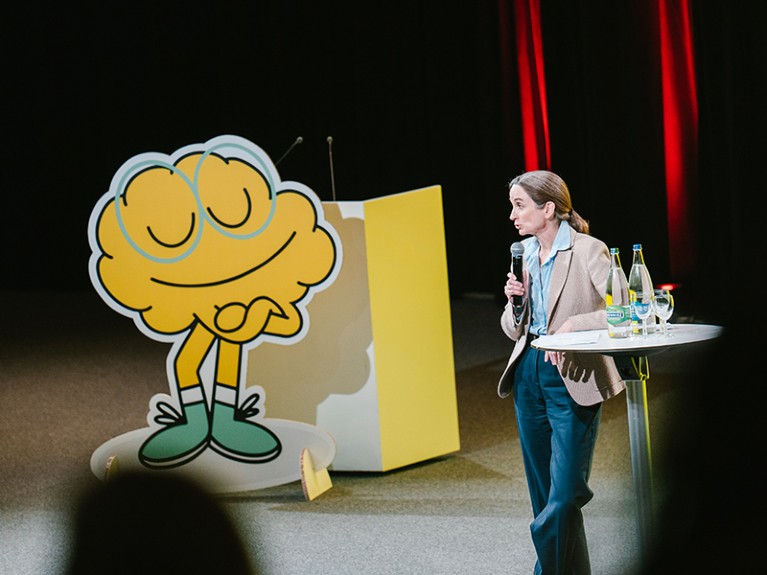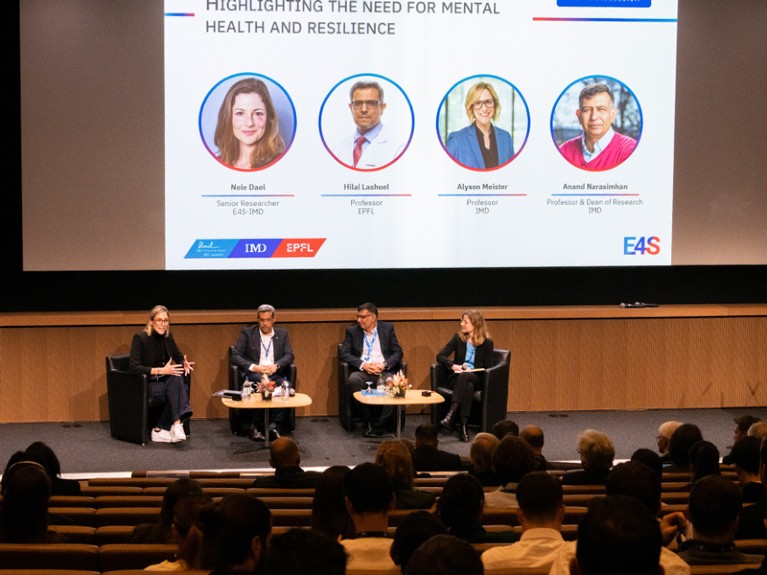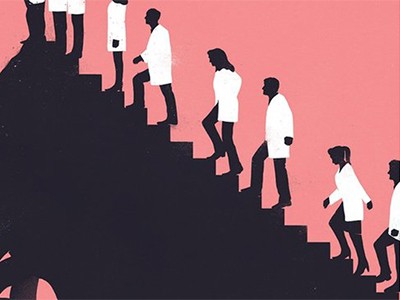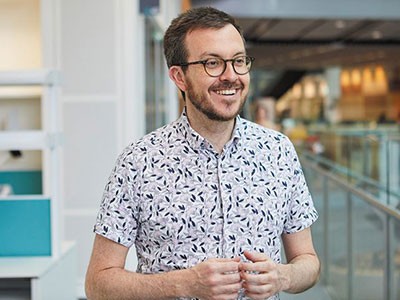
Kathryn Hess Bellwald welcomes attendees to the opening of Mental Health Week at the Swiss Federal Institute of Technology Lausanne.Credit: Adrien Battier/EPFL
Christine Le was drawn to academia for many reasons: the hours are flexible, and researchers have broad licence to pursue interesting projects, collaborate with peers and mentor students. Le, a chemist at York University in Toronto, Canada, takes pride especially in ushering in the next generation of scientists. But she has also had to balance dozens of other tasks — from managing a budget to sitting on committees and drafting lesson plans — that sometimes leave her drained. As much as she enjoys her job as an associate professor and laboratory head, which she started almost three years ago, Le says that success sometimes comes at the expense of her own mental health. “You end up putting yourself on the back burner often, which you shouldn’t do, but it’s hard not to when there are people relying on you.”
If parts of this story feel familiar, it’s probably because a host of studies bear out the personal experiences of many in academia: that whereas students’ mental-health challenges are well documented, less attention has been paid to the well-being of principal investigators (PIs) as they navigate the rigours of a decades-long academic career. Faculty members around the world are stressed and overburdened, sacrificing their mental health for a profession that often fails to acknowledge the expectations it places on its scholars.
Science careers and mental health
To remove the stigma surrounding mental health, PIs are now sharing their experiences, prompting overdue conversations with their universities and research institutions about how they can improve support for their faculty members. In response, institutions are collecting data and pursuing new policies aimed at creating a healthy research community — not just for students, but also for faculty members and staff.
There’s a false idea in some academic circles that investing in a researcher’s well-being takes away from their productivity, says Hilal Lashuel, a neuroscientist at the Swiss Federal Institute of Technology Lausanne (EPFL). “But if you’re not doing well, you’re not at the top of your performance — and you’re not able to give to your students.” Lashuel became a vocal advocate for faculty mental health after experiencing two heart attacks in three years. Being a PI is not a simple job, Lashuel says, and many accept the need to make sacrifices, including working long hours at the expense of family time. “When an institution hires someone, the expectation is that you dedicate yourself and you do everything you can for the well-being of the institution,” he says. “I would simply expect reciprocity, that the institutions and universities start to think about the wellness of the people.”
Career roller coaster
For newly hired faculty members, their first day marks the culmination of years of hard work — an exit from the volatile postdoctoral job pool and a sense of having made it as a career scientist. Yet the reality can feel alien compared with their experiences as a PhD student or postdoc.

Hilal Lashuel (second from left) speaks on a panel about mental health and resilience at the International Institute for Management Development in Lausanne, Switzerland.Credit: Mark Henley/IMD
“It was the hardest transition for me by far,” Le says of the shift from postdoc to faculty member. Although she wasn’t the only new PI in her department, an obvious change was that she suddenly lacked a cohort of peers all navigating a similar career stage — something that had made previous low points bearable. “The moment that you step into this role as a PI, that community is somewhat lost. You definitely have your colleagues, but they’re not all at the same stage of their careers as you, and might not be able to understand what you’re going through or give you advice.”
Early-career faculty members must also contend with a crush of new demands — many unrelated to their research pursuits. “You spend all this time training to be rigorous, to do high-impact research, to write, to do all these things that make you a good scientist,” Le says. But, since starting her position at York University in 2020, Le has been struck by how much of the job comes down to things that she wasn’t trained for. These include managing the different personalities in her lab, keeping her research group on track and supplied with work and materials, and building and installing new equipment. Learning these skills on the fly has been difficult, she says.
Why I became a mental-health first-aider at my research institute
It can also be challenging to prioritize a life outside the lab that helps to buffer against burnout at work. Jennifer Paxton, an anatomist and tissue engineer at the University of Edinburgh, UK, is eight years into her faculty position, but says she has always struggled with impostor syndrome — the nagging sense of self-doubt that can often eclipse feelings of success and accomplishment. As the mother of a young daughter, she says she sometimes feels judged in both her personal and professional lives. She feels she is considered an inferior scientist for turning down some opportunities, and a poor mother for prioritizing her career.
Returning from maternity leave in 2018, she felt isolated and was reluctant to reach out to colleagues for support with her feelings of inadequacy. “I didn’t want to have those coffee-room conversations; I didn’t want to speak about anything, because I was so scared that somebody was going to ‘find me out’.”
It took a senior colleague pulling her aside and expressing concern over some of the things Paxton had said, including the feeling that she didn’t belong in academia, for her to realize how low she was feeling, she says (see ‘Tips for supporting one another’). The colleague shared some of her own experiences, and the exchange prompted Paxton to pursue postnatal therapy. “It really helped [to have] some open and honest conversations with people who were slightly further through their careers and could say ‘This is normal, and actually you are doing a good job’.”
Even landing tenure and the job security it provides doesn’t necessarily guarantee a smooth ride. Decades into a faculty position, determining what success looks like becomes more nebulous, and researchers can feel irrelevant when their field’s inclination is to embrace what is ‘new’, says Sagar Parikh, a psychiatrist at the University of Michigan in Ann Arbor who studies workplace depression. Furthermore, senior researchers might lack advancement opportunities, which “can easily lead to despair and an exaggerated sense of loss”, he says. To keep things fresh, Parikh moved to Michigan’s medical school after working for two decades at the University of Toronto in Canada, to give himself “a new challenge and new sense of meaning”. However, he adds, universities can — and should — work harder to address their staff’s health and well-being across all career stages. For example, departments might create positions or challenges for late-career investigators that leverage their experience or provide them with ongoing professional development.
Mental-health momentum
Despite these challenges, many researchers say that they don’t think academia is inherently incompatible with long-term happiness. The motivation to address faculty mental health is also gaining momentum as more people eschew stigma and speak out, drawing the attention of senior managers at their institutions. Indeed, a 2020 survey by the American Council on Education found that the mental health of students and faculty members were the two most pressing priorities among university presidents. This is crucial, says Lashuel, because directors, deans and presidents dictate funding on campus. Their buy-in, he adds, goes beyond paying lip service to a sensitive topic to enabling true change.
In October last year, Santa Ono, a survivor of suicide who speaks openly about his struggles with bipolar disorder, joined the University of Michigan as its president. A university spokesperson says that since Ono’s appointment, the university has launched a well-being collective that includes an advisory council to track emerging research and a steering committee to hold the university accountable.
In late 2021 and early 2022, Parikh and his colleagues also piloted two courses on how to recognize and respond to someone in distress — one for staff and one for managers, which they hope to make mandatory. The content was developed in partnership with a committee of staff and students to address the unique needs of their campus, and acknowledges the difficulties of reaching out to someone who is struggling, Parikh says. The course, for example, might include language for how to approach a colleague who came to a meeting while drunk. “The reality is that we see distress in colleagues or students all the time,” he says. “Many of us have first-aid training — so if somebody’s bleeding, we know to put pressure on the wound — [but] have faculty learnt the basics of mental health?”
Four tips to ward off impostor syndrome
Lashuel is also working with his university to improve mental-health resources on campus, and says that it has been extremely supportive of him speaking out. “A university is a highly interconnected community. If one part of the community is not doing well, the community as a whole will be affected,” says Kathryn Hess Bellwald, associate vice-president for student affairs and outreach at EPFL. “It is essential to strive to improve the well-being of all members of the community.” Lashuel and Bellwald joined forces to spearhead a mental-health and well-being survey as part of a campus-wide mental-health week last November. The survey results, to be published this summer, will inform a campus mental-health strategy for both students and staff. “Once you have the numbers, nobody can turn their face away from the magnitude of the problem,” Lashuel says.
On a smaller scale, group leaders suggest cultivating a supportive social network. Community takes many forms, but Le advocates creating a support system that is “broad and diverse”. Although her university paired her with two senior mentors, she has since reached out to other academics — including a group for recent chemistry hires on the messaging app Slack — who give her advice on everything from grant applications to navigating challenges with students. She also relies on her family and partner for quality time away from work, and has begun seeing a therapist after a colleague shared how meaningful therapy had been for them. “I try to be open about that, especially with my students who might be struggling with their mental health. Therapy has been really helpful,” Le says.
The work flexibility that academics often enjoy can be a helpful strategy for coping with mental-health issues. Peter Rohde, a quantum-computer scientist at the University of Technology Sydney, Australia, was diagnosed with bipolar disorder as a PhD student, which causes him to experience rapid cycles of mania and depression. “The way I feel today isn’t really any indication of the way I’ll feel tomorrow or the day after,” he says, which can make planning his time a challenge. He has what he calls a “ride the wave” strategy, in which he uses his manic periods to get ahead on his work, regardless of the time of day, knowing that he can afford to pull back on tasks if he hits a rough patch during the working day.
Like Le, Rohde is fairly open with his students and colleagues, in part to make them aware of his work schedule and also because trading coping strategies can broaden the collective toolkit for addressing mental-health concerns, regardless of whether the other person has a diagnosis. And, he points out, group leaders who speak freely about their own mental-health struggles help to erase the stigma that can stop scientists from reaching their full potential.
“It’s really important for people facing these challenges to speak openly about it, despite how personal it is,” Rohde says. On the rare occasion that someone reacts poorly to his disclosure, it can be a shock, he adds. “But just having those conversations helps people discover things for themselves.”




